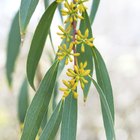
Peppermint oil, the pure distillate or extract of the peppermint plant, is used to reduce respiratory congestion. Peppermint oil and its main active ingredient menthol are present in lozenges, salves, inhalants and sprays for the throat, sinuses, nose and lungs. While preliminary research supports its safety for most adults, always seek the advice of a physician before use as adverse reactions may occur.
Active Ingredients

Peppermint oil contains 2 to 7 percent methofurane, 2 to 3 percent isomenthone, 2.5 to 3.5 percent neomenthol, 3 to 5 percent acetate, 15 to 20 percent menthone, 35 to 45 percent menthol, and trace amounts of flavonoids and other compounds.
The Institute of Biological Chemistry at Washington State University states that peppermint oil's two key components, menthone and menthol, are interrelated. Menthone breaks down as oil matures during the flower development stage to form menthol and neomenthol. This is important because menthol contributes to peppermint oil's characteristic taste, aroma, cooling, and decongestant properties.
Menthone, menthol, isomenthone and acetate are partially responsible for the stimulating effect of peppermint oil, according to the National Institute for Environmental Studies in Japan. This stimulant quality is beneficial during the day but limits peppermint oil's usefulness as a decongestant when sleep is desired.
According to Jeremy Spencer's research published in the "Chemistry Society Review," flavonoids exhibit anti-inflammatory and antioxidant activity. More research is needed to determine if flavonoids enhance peppermint oil's decongestant properties.
Importance of Menthol
Menthol is the primary active ingredient found in peppermint oil believed to reduce sinus and chest congestion. Menthol acts as an expectorant, thinning the mucus and breaking up phlegm. Additional research is needed to better evaluate the impact of menthol and peppermint oil’s other components on respiratory functions.
Methods of Use

Germany’s herbal regulatory agency, the Commission E, outlines four methods for the use of peppermint oil. These include drinking peppermint tea, inhalation, nasal ointments and other topical ointments. While these methods are considered safe for most adults, always contact your physician before use as individual reactions may vary.
The release of peppermint oil from the leaves of the peppermint plant is stimulated by heat and pressure, therefore diluted peppermint oil is present in freshly brewed peppermint tea. The Commission E recommends a cup of peppermint tea two to three times daily for adults. Peppermint tea is prepared by steeping 1 tbsp. of leaves in a cup of steaming water. For maximum benefit, inhaling the steam before drinking the tea is suggested. Distilled or extracted oils are not recommended for peppermint tea preparation as these are highly concentrated and poor-quality oils may contain contaminates.
The Commission E recommends the inhalation of concentrated distilled or carbon dioxide-extracted peppermint oil for sinus congestion. It suggests placing three to four drops of peppermint oil in a basin of hot water and inhaling the steam. As an alternative, three to four drops of peppermint essential oil are added to the water in a vaporizer, humidifier, shower or tub.
Topical application methods promote the inhalation of peppermint’s volatile oils. Inhalation is encouraged by placing a drop or two of peppermint oil on a finger and rubbing it under the nose or on the chest. Diluting the oil in grape seed or jojoba oil before application is recommended for sensitive skin.
Safety

Warm peppermint tea and topical peppermint oil are safe for most adults when used in small quantities, according to the Commission E. While peppermint oil is used internally in enteric-coated capsules for conditions other than those described here, additional research is needed. High levels of peppermint oil are considered toxic. Seek the advice of a physician before considering use in any form.
Warnings
Pregnant and lactating women, young children and infants are advised to avoid the use of peppermint oil unless under a physicians guidance. Direct application beneath the nose of an infant or small child is never recommended as the child may experience difficulty breathing. Allergic reactions, though rare, may occur with exposure to peppermint oil. IV injection of peppermint oil may cause death. See research for additional adverse reactions as this list is not all inclusive. This article on peppermint oil for nasal congestion is for informational purposes only. Always consult with your personal physician and health care providers before use.
Related Articles

Arnica for Acne

Anise Seed Cautions and Side Effects

Can Borage Oil Help Acne?

The Use of Neem Juice in Skin Care as ...

Peppermint Oil for a Cough

The Benefits of Lemongrass for Skin

What Is Aloe Good For?

The Effects of Organic Fertilizer on ...

How to Dilute Patchouli Oil

Is a Sauna Good for Healing Scars?

Eucalyptus Oil & Acne

Chasteberry for Acne

Dangers of Spray on Tan

Toxicity of Peppermint Oil

What Are the Benefits of Aloe Vera & ...

How to Treat Hematoma & Swelling After ...

Side Effects of Monosodium Glutamate

Natural Ways to Get Rid of Scabies

Bitter Melon for Acne

Dimethicone Hazards
References
- American Cancer Society: Peppermint
- “Smart Medicine for Healthier Living”; Janet Zand, L.Ac. O.M.D., Allen N. Spreen, M.D., C.N.C., James B. Lavalle, R.Ph., N.D.; 1999
- “PDR for Herbal Medicines”; Medical Economics Company; 2000
- University of Maryland Medical Center; Peppermint
- “Practical Aromatherapy”; Penny Rich; 1994
Writer Bio
Based in Tampa Bay, Laurice Maruek began writing articles for LIVESTRONG.COM in 2010. Maruek is an experienced yacht chef, nutritionist, massage therapist, sports and rehabilitation flexibility and strength trainer. Maruek holds a Master of Science in clinical nutrition from Texas Woman's University and a certificate of natural health in massage therapy.
Photo Credits
Minze image by womeninblack from Fotolia.com